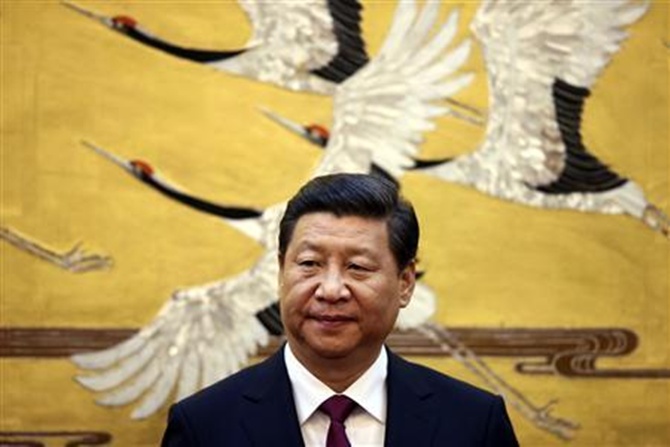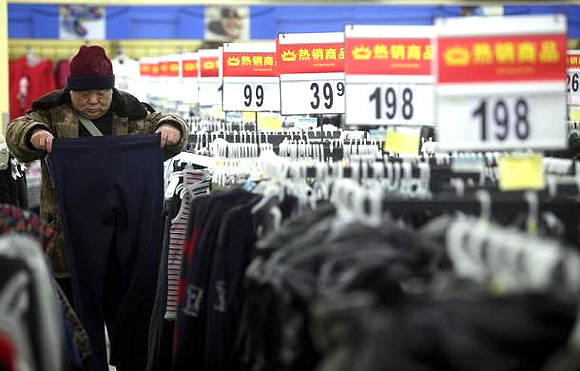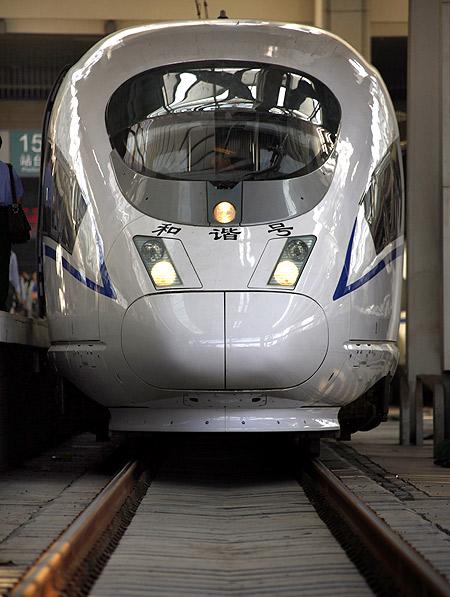Photographs: Jason Lee/Reuters Shyam Saran
China's ambitious reform road map could transform the country's economy, but it conceals a return to old-style authoritarianism, says Shyam Saran.
The 18th National Congress of the Communist Party of China held its much-anticipated Third Plenum from November 11 to November 15, 2013.
It was billed as being as significant and historic as the first-generation reforms inaugurated by Deng Xiaoping in 1978 and the second-generation reforms, also pushed forward by him in 1992 against conservative opposition within the party.
The latest plenum has adopted a comprehensive, ambitious and far-reaching road map for political, social, economic and legal reform. Analysts have identified as many as 60 separate decisions covering virtually every sector of national endeavour.
These must be implemented by 2020, when the "China dream" of renewal and rejuvenation proclaimed by its new paramount leader, Xi Jinping, will be realised. If ambition is indeed translated into practical action, China's regional profile in Asia is likely to become unassailable.
It would also have a more credible claim to a global status rivalling the United States. This will fundamentally alter the geopolitical landscape in which India must find its own place.
...
Can China rival United States as an economic superpower?
Image: President Xi Jinping .Photographs: Reuters
The plenum has marked the emergence of Xi Jinping as the undisputed leader in the mould of Deng Xiaoping, and away from the more collective leadership format we have seen in the past two decades.
The reform blueprint bears his personal stamp. It was Mr Xi, rather than the head of the executive, Li Keqiang, who introduced the decision document.
The document marks Mr Xi's own version of the well-known Chinese principle of "walking on two legs". Sweeping economic reforms are to be accompanied by much more pervasive, elaborate and effective security controls.
Thus, while there will be a "leading group" to design, implement and monitor the reform programme, there will also be a parallel "national security committee", which will co-ordinate the different instruments of state security towards ensuring that economic reforms do not endanger social stability or the political primacy of the Communist Party.
The setting up of these two powerful bodies at the central level, outside the normal party and state hierarchy, will also serve to strengthen the power and authority of Mr Xi, to whom they will be expected to report.
...
Can China rival United States as an economic superpower?
Photographs: Carlos Barria/Reuters
Some may consider that such "neo-authoritarianism" is not compatible with the greater embrace of free-market principles.
However, for the past three decades, China has successfully juggled these two apparently contradictory principles, thereby achieving spectacular economic success with relative political stability.
It remains to be seen whether this formula, now christened the "Beijing consensus", will continue to be as successful a template for the future as it has been in the past.
If it continues to deliver results, as Chinese leaders both hope and believe, then the liberal and free-market capitalist system will face an existential challenge, particularly if recovery in the Western world continues to be anaemic.
…
Can China rival United States as an economic superpower?
Image: A woman rides past a clothing store at the business area of Jiaozuo, China's central Henan province.Photographs: Aly Song/Reuters
Several plenum decisions are noteworthy. On the political side, the abolition of the labour reform camps is an important break with the country's Stalinist past.
So is the decision to do away with the urban registration, or "Hukou", system, which has created a pool of more than 200 million migrant Chinese urban dwellers who have no access to urban services or social protection. The removal of barriers to population mobility will have far-reaching social and economic consequences, as will the partial relaxation of the unpopular "one child per family" rule.
On the economic side, the key decision accords a "decisive" role to market forces in the allocation of resources. This means the embrace of competitive pricing for oil, gas, water, power, transportation and telecom services.
If implemented, this will mean a major change in the functioning of the economy and could lead to the much-needed shift from an investment-led, energy-intensive pattern of growth to one that is more consumer demand-driven.
...
Can China rival United States as an economic superpower?
Photographs: Reuters
What will not change is the privileged status of the state-owned enterprises, which will continue to occupy the commanding heights of the economy, even though they will have to survive and flourish in a much more competitive environment.
The document asserts that financial and banking reforms will continue. There is likely to be, in the days to come, full interest rate liberalisation.
A deposit insurance scheme is being put in place and the internationalisation of the yuan will be further advanced through additional doses of capital account liberalisation. Importantly, land will continue to be only partially marketised, but rural landholders may benefit from appreciation in the value of the land they occupy, even if ownership, free sale and purchase have yet to be conceded.
Much of the plenum's reform agenda is not new. Several measures have been on the party's reform road map for several years but could not be implemented.
These include the reform of the household registration system, the economic pricing of resources and public services, and the development of capital markets with market-based determination of interest rates and the yuan's exchange rate.
The delay in implementing these reforms had led the then premier, Wen Jiabao, to warn in 2011 that it had become urgent to avoid "unstable, imbalanced, unco-ordinated and unsustainable economic development".
...
Can China rival United States as an economic superpower?
Photographs: Reuters
What was different at this plenum was that the focus on comprehensive reform went beyond economic measures and specified a target date for implementation.
Above all, the setting up of a small leading group on reform, which may be led by Mr Xi himself, and the establishment of the national security committee, functioning over the party and governmental establishment, are designed to give Mr Xi the means to achieve results.
This carries risks, especially if powerful vested interests continue to resist change, as they have done in the past.
A visible turn towards a more authoritarian and personality-based style of leadership is what may seem to be required to enable China to traverse a more challenging and even risky phase of reform.
As India confronts its own roadblocks to second-generation reforms, is there likely to be an Indian incarnation of Mr Xi waiting in the wings to lead the charge?
...
Can China rival United States as an economic superpower?
Photographs: Carlos Barria/Reuters
There is no doubt that China's example is leading to what one analyst has called "dictator envy" in our country. There is a yearning for a strong, authoritarian leader who will be decisive, can make things happen and can put India back on track. But this is an illusion.
India is not China, and our own experience has demonstrated that any recourse to authoritarianism can only achieve temporary results. Nor has the practice of liberal democracy in our country proved to be incompatible with high rates of GDP growth.
What has been evident in the past few years is a failure of imagination on the part of India's elite and the lack of articulation of an overarching national narrative that is able to cut across India's rich diversity and political and social plurality in order to sustain a journey towards a common destination.
China's example should not become the defining template for India's development in the 21st century.
The writer, a former foreign secretary, is currently chairman, National Security Advisory Board and Research and Information System for Developing Countries, and senior fellow, Centre for Policy Research (New Delhi)









article